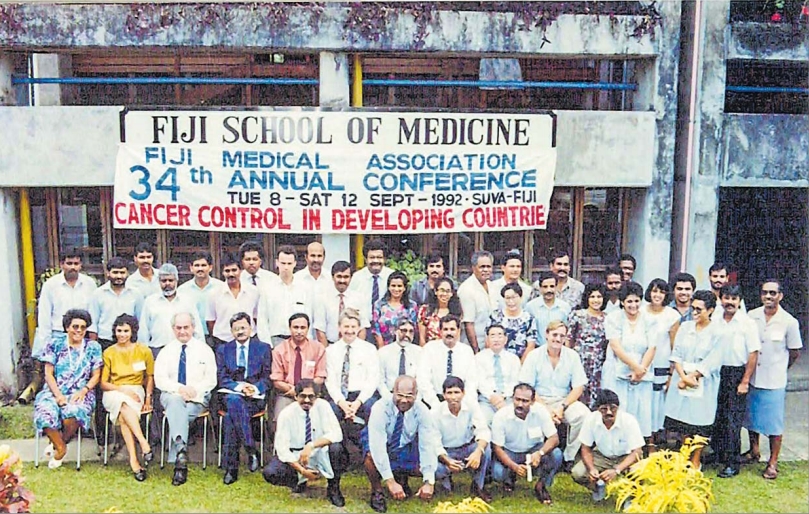Between 1986 and 2012, the Fiji School of Medicine (FSMed) now College of Medicine, Nursing and Health Sciences underwent a period of profound transformation, evolving from institutional crisis to regional leadership in health professional education.
In 1986, the World Health Organization (WHO) developed a Master Plan outlining long-term reforms and strategies for the School’s sustainability.
That same year, the Eleventh Regional Conference of Permanent Heads of Pacific Health Services endorsed incorporating FSMed into the University of the South Pacific (USP) and recommended transferring dental training to the University of Papua New Guinea (UPNG) to consolidate scarce regional resources.
In 1987, FSMed celebrated the graduation of its first cohort of 20 MBBS doctors. However, this achievement was overshadowed by Fiji’s military coups, which destabilized the institution, disrupted operations, and led to significant faculty departures.
In 1988, FSMed marked its centenary while under immense strain. Severe staffing shortages delayed programs and reduced graduate output. WHO intervened by providing technical and academic support, and in 1989 developed a comprehensive Plan of Action recommending greater institutional autonomy, stronger governance, financial independence, and the adoption of a problem-based learning (PBL) curriculum tailored to Pacific health needs. These reforms signalled a decisive shift towards modern, community-oriented training.
Throughout the 1990s, FSMed consolidated and expanded its programs. A new MBBS curriculum was introduced in 1991, alongside the Primary Care Practitioner program. By the mid-1990s, with support from AusAID, a revised FSMed Development Plan was endorsed by regional health ministers and the Fiji Cabinet.
In 1995, the Yanuca Accord paved the way for postgraduate specialist training programs, beginning with a Postgraduate Diploma in Anaesthesia and later expanding to Obstetrics and Gynaecology, Paediatrics, Internal Medicine, and Surgery. Supported by AusAID and regional partners, FSMed awarded more than 200 postgraduate diplomas and 50 master’s degrees by 2010.
Institutional autonomy was achieved in 1998 through a revised Memorandum of Understanding with USP. The following year, USP endorsed several FSMed degrees, including the Master of Medicine, Master of Public Health Practice, and Bachelor of Environmental Health. A five-year capital and staff development plan was also introduced.
Between 1996 and 2000, FSMed entered a phase of modernization and research development.
Accreditation processes were initiated to align programs with international standards, and a Research and Ethics Committee was established to guide Pacific-focused research and uphold ethical practice. Medical education became more community-oriented, with structured rural attachments ensuring training was responsive to health service realities in island settings.
During this period, the Secretariat of the Pacific Community (SPC), WHO, and FSMed collaborated to coordinate regional health workforce planning.
The early 2000s brought major infrastructural growth and programme expansion.
FSMed launched new undergraduate programmes in public health nursing, dietetics, physiotherapy, medical laboratory science, imaging sciences, and pharmacy.
In 2001, FSMed secured €7.5 million in European Union funding for a campus development project, and by 2005 the new Pasifika Campus was completed, equipped with modern laboratories and dental clinics.
Following a major review in 2006, FSMed restructured its governance and operations, creating new director roles and renaming schools as departments.
That same year, the Pasifika Campus was officially opened by the late Vice President Ratu Joni Madraiwiwi, and FSMed launched the EU-funded Kiribati Project, further strengthening its regional reach.
A turning point came in 2010, when FSMed was formally incorporated into the newly established Fiji National University (FNU) as part of the College of Medicine, Nursing and Health Sciences (CMNHS). This merger unified FSMed with the Fiji School of Nursing and other training institutions, consolidating health education under a national framework while maintaining FSMed’s regional mandate.
By 2012, FSMed had strengthened postgraduate training and research capacity, producing graduates who served across the Pacific and aligning its programs with priority health issues such as non-communicable diseases, maternal and child health, and rural service delivery.
That same year, FSMed opened its first off-island student accommodation in Honiara, Solomon Islands, funded by Australia, which supported final-year medical students during internships.
With the support of WHO, SPC, and donor partners, FSMed successfully transitioned from the instability of the late 1980s into a resilient, modern institution, firmly established as a cornerstone of Pacific health workforce development.



